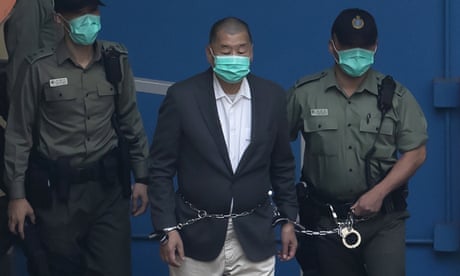Sue-lin Wong becomes latest foreign journalist to be forced out of the city as concerns about press access and freedoms grow

The Foreign Correspondents’ Club of Hong Kong last year reported ‘highly unusual’ delays in visa approval for multiple media outlets.
Photograph: Anthony Wallace/AFP/Getty Images
Guardian staff with agencies
Sat 13 Nov 2021
Hong Kong has refused to renew the visa of an Australian correspondent from the Economist, the newspaper’s chief editor said, amid a crackdown on free speech and dissent in the city.
Sue-lin Wong is one of several foreign journalists working in Hong Kong to be forced out in recent years.
Press freedoms in the once-outspoken city have been reined in as China remoulds Hong Kong, following huge democracy protests in 2019 and Beijing’s imposition of a strict national security law last year.
Wong, who is not currently in Hong Kong, was refused permission to return to work in the city, the paper’s editor, Zanny Minton Beddoes, said in a statement.
“We regret their decision, which was given without explanation,” she said.
“We urge the government of Hong Kong to maintain access for the foreign press, which is vital to the territory’s standing as an international city,” she added.
The Hong Kong government and immigration department did not immediately respond to requests from Reuters for comment.

‘They can’t speak freely’: Hong Kong a year after the national security law
Since Beijing imposed a national security law on Hong Kong last year, democracy activists, newspaper editors and journalists have been arrested. Critics of the legislation say it is being used to crush dissent in the city – claims the Hong Kong and Beijing authorities reject.
Fears over freedom of the press in the former British colony are increasing, months after the city’s most vocal pro-democracy newspaper, Apple Daily, was forced to shut after its tycoon owner, Jimmy Lai, and other staff were arrested under the national security law.
In 2018, the visa of the Financial Times’ Asia editor, Victor Mallet, was not renewed by Hong Kong after he moderated a speech by a pro-independence activist at an event hosted by the Foreign Correspondents’ Club in the city. The move alarmed some diplomats and business groups in Hong Kong.
The Foreign Correspondents’ Club of Hong Kong last year reported “highly unusual” delays in visa approval for multiple media outlets.
On the authoritarian Chinese mainland, where the press is heavily controlled and censored, foreign journalists must apply for specific visas and face routine harassment. Reporters only need a regular business visa to work in Hong Kong, however.
As of April, 628 foreign employees working for overseas media held work visas in Hong Kong, according to the Chinese foreign ministry.
Hong Kong is guaranteed freedom of speech and the press under article 27 of the Basic Law, the mini-constitution agreed by China when it took back control of Hong Kong in 1997.
Hong Kong’s leader, Carrie Lam, has denied the security legislation would curtail media freedom, saying that “freedom of expression, freedom of protest, freedom of journalism, will stay”.
Reuters and Agence France-Presse contributed to this report.
Guardian staff with agencies
Sat 13 Nov 2021
Hong Kong has refused to renew the visa of an Australian correspondent from the Economist, the newspaper’s chief editor said, amid a crackdown on free speech and dissent in the city.
Sue-lin Wong is one of several foreign journalists working in Hong Kong to be forced out in recent years.
Press freedoms in the once-outspoken city have been reined in as China remoulds Hong Kong, following huge democracy protests in 2019 and Beijing’s imposition of a strict national security law last year.
Wong, who is not currently in Hong Kong, was refused permission to return to work in the city, the paper’s editor, Zanny Minton Beddoes, said in a statement.
“We regret their decision, which was given without explanation,” she said.
“We urge the government of Hong Kong to maintain access for the foreign press, which is vital to the territory’s standing as an international city,” she added.
The Hong Kong government and immigration department did not immediately respond to requests from Reuters for comment.

‘They can’t speak freely’: Hong Kong a year after the national security law
Since Beijing imposed a national security law on Hong Kong last year, democracy activists, newspaper editors and journalists have been arrested. Critics of the legislation say it is being used to crush dissent in the city – claims the Hong Kong and Beijing authorities reject.
Fears over freedom of the press in the former British colony are increasing, months after the city’s most vocal pro-democracy newspaper, Apple Daily, was forced to shut after its tycoon owner, Jimmy Lai, and other staff were arrested under the national security law.
In 2018, the visa of the Financial Times’ Asia editor, Victor Mallet, was not renewed by Hong Kong after he moderated a speech by a pro-independence activist at an event hosted by the Foreign Correspondents’ Club in the city. The move alarmed some diplomats and business groups in Hong Kong.
The Foreign Correspondents’ Club of Hong Kong last year reported “highly unusual” delays in visa approval for multiple media outlets.
On the authoritarian Chinese mainland, where the press is heavily controlled and censored, foreign journalists must apply for specific visas and face routine harassment. Reporters only need a regular business visa to work in Hong Kong, however.
As of April, 628 foreign employees working for overseas media held work visas in Hong Kong, according to the Chinese foreign ministry.
Hong Kong is guaranteed freedom of speech and the press under article 27 of the Basic Law, the mini-constitution agreed by China when it took back control of Hong Kong in 1997.
Hong Kong’s leader, Carrie Lam, has denied the security legislation would curtail media freedom, saying that “freedom of expression, freedom of protest, freedom of journalism, will stay”.
Reuters and Agence France-Presse contributed to this report.
No comments:
Post a Comment